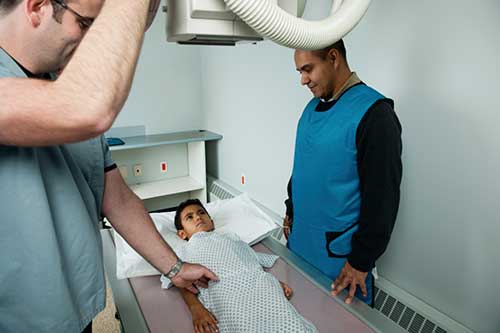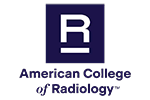Radiation Safety for Children
- Is it safe for my child to have x-rays?
- Some imaging exams use radiation; others do not
- What are the effects of radiation?
- Is the benefit of the imaging test worth the very small potential risk?
- One size does not fit all
- Are the facility and its equipment accredited by the American College of Radiology (ACR)?
Is it safe for my child to have x-rays?
Medical imaging is valuable. Diagnostic imaging exams help your doctor accurately diagnose and treat your child's condition. Doctors also use radiation to effectively treat certain conditions, but that type of radiation use is considered therapy and not diagnostic imaging. For more information, see What is RadiationTherapy.
It should be noted that radiation from diagnostic imaging exams may present a very small risk. It is important to know that everyone is exposed daily to small amounts of radiation as part of our natural environment. This is called natural background radiation. Most discussions of medical imaging radiation compare exposures to this natural background radiation. This helps you understand and compare the information with the radiation that our bodies are already accustomed to receiving. For more information, see Radiation Dose in X-Ray and CT Exams.
Some imaging exams use radiation; others do not
Many types of medical imaging exams use radiation to produce diagnostic information.
Plain x-rays, fluoroscopy (uses continuous or “live” x-rays like a movie) used for upper GI and lower GI exams, computed tomography (CT) scans, some image-guided procedures, and all nuclear medicine tests involve radiation. Ultrasound imaging and magnetic resonance imaging (MRI) do not use radiation. For more detailed information, see the Upper GI and Lower GI pages.
What are the effects of radiation?
Very large doses of radiation from some medical procedures have the potential to cause temporary skin burns, but this is very rare. A more common concern is whether radiation from routine diagnostic imaging exams can cause cancer. There is no conclusive evidence that the small amounts of radiation from diagnostic imaging cause cancer, but large population studies have shown a slight increase in cancer from large amounts of radiation.
Is the benefit of the imaging test worth the very small potential risk?
To help determine if the benefit from having the imaging test is worth the very small potential risk, you should ask your doctor:
- Is the imaging test medically necessary?
- If the answer is yes, then the benefit will most certainly outweigh the risk.
- Can previous tests substitute for this exam?
- If your child has had other imaging exams that your doctor is not aware of, make sure your doctor receives copies of those exams. You may be able to avoid repeating exams that your child has already undergone.
- Are there alternative imaging exams that do not require radiation?
- Ask your doctor if it is possible to substitute ultrasound or MRI instead.
- Is the facility familiar with imaging children?
- Children should have exams properly tailored for their size and weight.
One size does not fit all
With radiation exposure, one size does not fit all. This is a point of emphasis of the Image Gently® campaign, developed by an alliance of medical societies and professionals focused on radiation safety for children.
Are the facility and its equipment accredited by the American College of Radiology (ACR)?
Accreditation in United States facilities ensures a high standard of image quality, ongoing oversight by a medical physicist, and proper monitoring of radiation exposure.
Additional Information and Resources
The Image Gently Alliance: imagegently.org
Image Wisely: imagewisely.org
This page was reviewed on November 01, 2022



